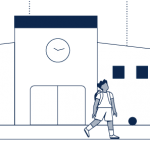South West Institute of TAFE is the largest provider of technical and vocational education in the southwest part of the State Victoria, Australia. Spread over four campuses and a large geographical area, SW TAFE was determined to provide staff and students with the capacity to learn virtually as well as in a face to face setting.
To do this, SW TAFE recognized the need to make their classrooms “smart” by equipping them with the technology tools that would support collaboration and learning from multiple locations.
SW TAFE recognized that while the visible technology tools were important, they would not provide the requisite functionality unless they were underpinned by robust and scalable core infrastructure. To this end, SW TAFE implemented Cisco Meraki Wireless technology to provide fast connectivity to students and faculty, the capacity to generate and exploit data and analytics provided in the infrastructure, and reduced operational complexity in the backend. SW TAFE also implemented TelePresence units in selected classrooms, underpinned by Cisco Call Manager and Cisco WebEx.

According to Director of Business Renewal at SW TAFE, Brad Henderson, “The smart classroom for us is all about our students. We want them to be highly engaged in their training at SW and able to collaborate – not just interact – using technology.”
Prior to implementing the Cisco collaboration technology, the institute had identified shifts in the way students were learning. According to Brad, students were gathering in groups, whether on campus or off, and interacting with the course material on their devices. Because of students’ desire to learn in an accessible, simple and collaborative way, SW TAFE wanted to give students the opportunity to learn anywhere, on any device, at any time through virtual lectures and classes.
For the students that physically need to be on campus, the new technology allows them to engage with the course material like never before. For example, students who are studying to be automotive mechanics can now observe an engine being fixed through use of video in the smart classroom, and can watch a recording of the lecture at a later time if they need to refresh their learning.
“Smart campus isn’t so much about the physical reality of the technology, but what it enables our students to do,” said Brad.
Through the implementation of smart classroom technology, SW TAFE is bridging communication challenges that existed between their four campuses and reach and educate more students than ever before.

“The smart classroom is a big step forward, a big change, but will set the standard in terms of learning in the years to come,” said Brad.
While the institution has had a positive response to the adoption of this technology, they’ve had to tackle many challenges around change and expectation management and learn as they went. This includes collaboration between technology and teaching and learning functions within the institute to ensure that the initial designs and blueprints are adaptive to the feedback provided by the ultimate users of the technology (the teachers).
The institute will continue to bring innovative technologies and learning methods to their students, enabling them to provide cutting edge trainings and skill development to the current and future TAFE students in Australia.


CONNECT WITH US